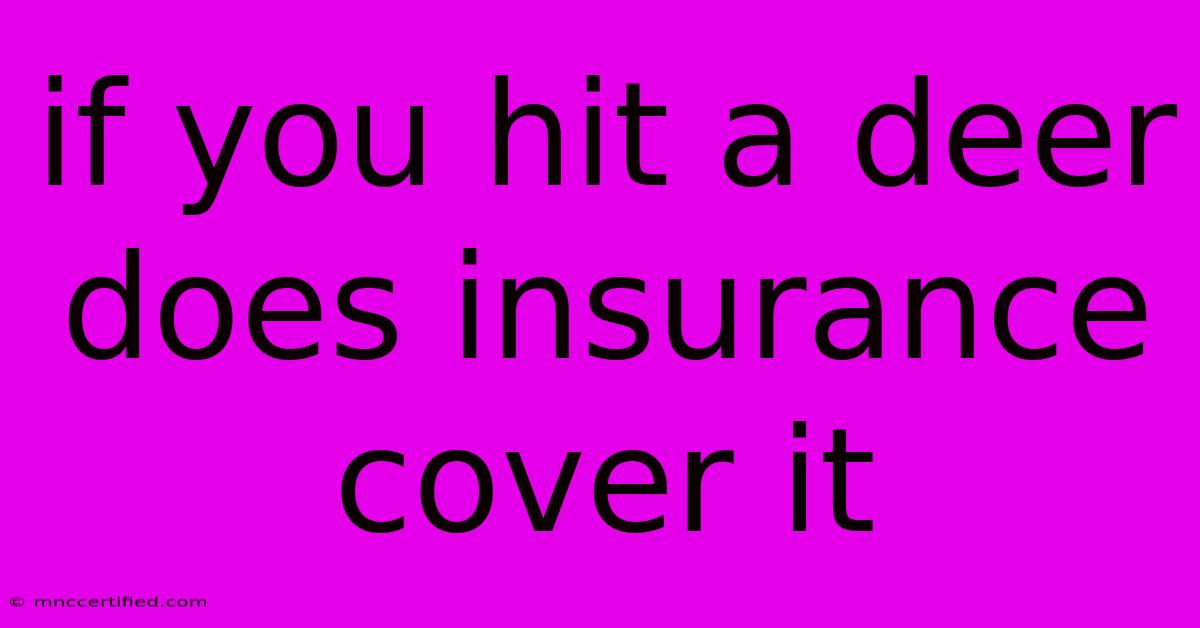If You Hit A Deer Does Insurance Cover It

Table of Contents
Hit a Deer? What Your Insurance Will Cover
Deer collisions are a common occurrence, especially during the fall and early winter months when deer are more active. If you're unfortunate enough to hit a deer, you'll likely be dealing with car damage and a whole lot of stress. But what about your insurance? Will it cover the costs?
The good news is, in most cases, your car insurance will cover the damages resulting from a deer collision. However, the extent of coverage depends on your policy and the specifics of the incident. Here's a breakdown of what to expect:
Understanding Your Coverage Options
- Collision Coverage: This is the most common type of insurance that covers damages to your car, regardless of who is at fault. If you have collision coverage, your insurer will pay for repairs or replacement of your vehicle up to your policy's limit, minus your deductible.
- Comprehensive Coverage: This coverage typically handles damages caused by incidents not involving another vehicle, such as theft, vandalism, fire, and... you guessed it, hitting animals. So, if you have comprehensive coverage, your insurance will cover the cost of repairs or replacement minus your deductible.
- Uninsured/Underinsured Motorist Coverage: This coverage comes into play if you're hit by a driver who doesn't have insurance or doesn't have enough coverage to cover your damages. It may also apply if you hit a deer and the deer's owner is uninsured or underinsured.
What Happens After You Hit a Deer?
- Stay Safe: First and foremost, ensure your safety and the safety of others. Pull over to a safe location and assess the situation.
- Document Everything: Take pictures of the damage to your car, the deer (if possible), and the surrounding area. This will be helpful when filing your insurance claim.
- Call the Police: Even though it wasn't a collision with another vehicle, you should still report the incident to the police.
- Contact Your Insurance Company: Once you've gathered all the necessary information, call your insurance company and report the accident. They will guide you through the claims process.
What to Expect from Your Insurance Company
- Insurance Claim: Be prepared to provide detailed information about the incident, including the date, time, location, and any witnesses. You'll also need to provide documentation like police reports and photos.
- Deductible: Remember that your insurance company will likely require you to pay your deductible before they cover the remaining repair costs.
- Inspection: An insurance adjuster will inspect your vehicle to assess the damage and determine the extent of the repairs needed.
Important Considerations
- State Laws: Some states have laws regarding insurance coverage for animal collisions. Check your state's regulations to see if there are any specific requirements or exemptions.
- High-Risk Areas: If you live in an area with a high deer population, consider increasing your insurance coverage or adding a deer collision waiver.
- Avoid Deer Collisions: There are ways to reduce your chances of hitting a deer. Drive cautiously during twilight hours, be aware of your surroundings, and pay attention to deer crossing signs.
Hitting a Deer is a Stressful Situation
While your insurance company will cover the costs of repairs, the entire process can be overwhelming. Remember to stay calm, document everything, and contact your insurance company promptly. By following these steps, you can navigate the situation and get back on the road with minimal hassle.

Thank you for visiting our website wich cover about If You Hit A Deer Does Insurance Cover It. We hope the information provided has been useful to you. Feel free to contact us if you have any questions or need further assistance. See you next time and dont miss to bookmark.
Featured Posts
-
Cheap Dentist Las Vegas Without Insurance
Nov 07, 2024
-
Trump Visit Boosts Dogecoin Up 25
Nov 07, 2024
-
Washington Lieutenant Governor Race 2024 Results
Nov 07, 2024
-
Is A Septorhinoplasty Covered By Insurance
Nov 07, 2024
-
How Much Do Retainers Cost With Insurance
Nov 07, 2024